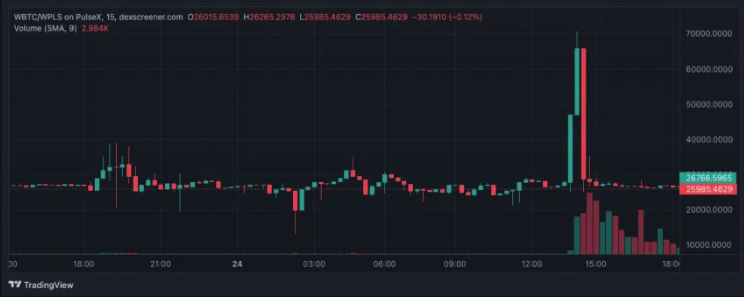Lucrative opportunities await in far-flung corners of the crypto market, as the price of wrapped Bitcoin on Richard Heart’s new PulseChain reached an all-time high of $70,000 last Wednesday.
The founder tweeted the new all-time high for Bitcoin (BTC) or wrapped Bitcoin (wBTC) after the asset spiked from $27,000 to $70,000.
Bitcoin Price Roller Coaster
The graph below shows wBTC’s parabolic rise from $27,000 to $70,000 in roughly 20 minutes.

The price stayed at $70,000 for 10 minutes before falling spectacularly to reclaim earlier levels.

The wrapped Bitcoin’s volatility revealed PulseChain’s weaknesses rather than its strengths after volume spiked for no reason when the price rose.
Activity on the platform was previously almost nonexistent, with one crypto user saying it took a sub-$40,000 capital injection to increase the wrapped-Bitcoin’s price, betraying the platform’s low popularity and use.
wBTC’s pronounced volatility in long and short trades is also characteristic of a classic pump-and-dump scheme. The low capital required to move markets suggests even non-whales could manipulate Bitcoin’s price on the network.
Lower Bitcoin liquidity after the collapse of Alameda Research allowed whales to move markets with lower trading volumes.
Since its launch, PulseChain has failed to meet its founder’s expectations. The project’s native HEX token has fallen by over 50% and gained minimal buy-in from DeFi participants.
Accordingly, users may also wonder why Heart would flaunt the spike in wBTC’s price.
Community Accuses HEX and Heart of Pyramid Scheme
PulseChain’s HEX website launched a dedicated scam section following complaints from the crypto community. Heart has also been publicly accused several times.
Skeptics highlight the promise of tangible rewards for holding crypto as a major red flag. HEX users can stake crypto to earn 40% in annual rewards.
Other factors lending doubt to the project’s credibility include:
- The founder Richard Heart (whose real name is Richard James Chueler), was previously accused of involvement in a 2002 spam-related scheme that went to trial.
- Chueler has openly admitted that PulseChain uses “tactics that a scam could use,” including referral bonuses and get-rich-quick schemes. Despite these questionable elements, the founder insists PulseChain is legitimate.
- HEX has minimal use cases.
- The HEX staking mechanism represents a Ponzi scheme. The project disincentivizes investors from withdrawing money through promises of high long-term returns and early withdrawal penalties.
CoinFabrik and ChainSecurity code audits confirmed that HEX smart contracts contain no bugs.
For BeInCrypto’s latest Bitcoin (BTC) analysis, click here.
Disclaimer
In adherence to the Trust Project guidelines, BeInCrypto is committed to unbiased, transparent reporting. This news article aims to provide accurate, timely information. However, readers are advised to verify facts independently and consult with a professional before making any decisions based on this content.




